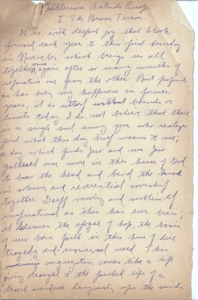Rabbi Eisendrath, Nazi Germany, and Palestine, 1935

Every once in a while, we archivists come across something that strikes a chord within us because of the current state of the Jewish world. Today, sadly, we are witnessing a resurgence of antisemitism in a raw and blatant form.
In 1935, Rabbi Maurice Eisendrath (our rabbi from 1929 to 1943) visited Germany and Palestine. Returning to North America, he landed in New York and was interviewed by a journalist. The report of that interview, published in The Reform Advocate, a Chicago Jewish periodical, and elsewhere, is our first record of Rabbi Eisendrath’s observations. Rabbi Eisendrath had visited Germany in 1933 and found the Jewish population “completely terrorized,” but now circumstances had become even worse.
“I saw evidences,” [Rabbi Eisendrath said,] “of new violence in the shattered name plates of Jews in front of several buildings. Then too, I saw the lorries filled with Brown Shirts on Kurfurstendam stopping in front of the various cafes, shouting ‘Jude Verrecke,’ and heard inflammatory speeches denouncing Jews who have the temerity to visit the cafes. On the whole, Jews do not frequent these cafes. These lorries had posters on them with slogans condemning both Catholics and Jews.”
“The passerby cannot, of course, glimpse the horror of the actual daily existence of the German Jews—the constant fear, the communication by whispers behind bolted doors and barricaded windows . To get below the surface, I spoke to a number of Jews and non-Jews. The situation, as everyone put it, is most heartbreaking and utterly hopeless. I spoke with a Jew from rural Germany who had come to Berlin. Not a customer had been permitted to enter his store for three weeks. Storm-troopers stood guard outside his doors to prevent anyone from entering. A recent development is not merely to refuse to buy from Jews, but to refuse to sell anything to them as well—not even the provisions needed for sustenance. Life is absolutely impossible for them in the small towns. In 1933 they were able to seek refuge in Berlin, but today their oppressors drive them from Berlin.”
In Palestine, Rabbi Eisendrath said, he had spoken to hundreds of young Germans who were exuberant and joyful over their escape from Germany. Magnificent work, he said, has been done in providing habitation for these refugees and some of the finest buildings he saw in most of the colonies were built with relief funds. The German Jewish youth, he added, are unanimous in their desire to rebuild their lives in Palestine, and in addition to the young people, erstwhile professional men and business men have been so completely affected by what has happened, that they want nothing more than to make a complete break from everything that is German—land, language, culture, and to reshape their lives in Palestine.
“I would like to add my personal testimony,” he said, “to the imperative necessity for continued relief in Germany. The people are starving. The only possible escape for the youth is by training them for admission to some other country. We must provide funds to give them the chance to escape.”
Once back in Toronto, Rabbi Eisendrath made it his task to tell audiences, Jewish and non-Jewish, of the horrors being endured by Jews in Germany and the urgent need to assist Jewish refugees in Palestine. A page from a manuscript of one of his addresses accompanies this article.
An early and acute observer of the situation in Germany, Rabbi Eisendrath’s experiences led him to reevaluate his opinions on pacifism and Zionism; something we will write more about in future articles in these pages.
Michael Cole and Howard Roger





A wonderful and moving bit of history. This report by Rabbi Eisendrath almost puts one back there in Berlin in 1933. Thank you Michael and Howard for digging this out and bringing it to our attention. Keep up the good work.
David Sandler